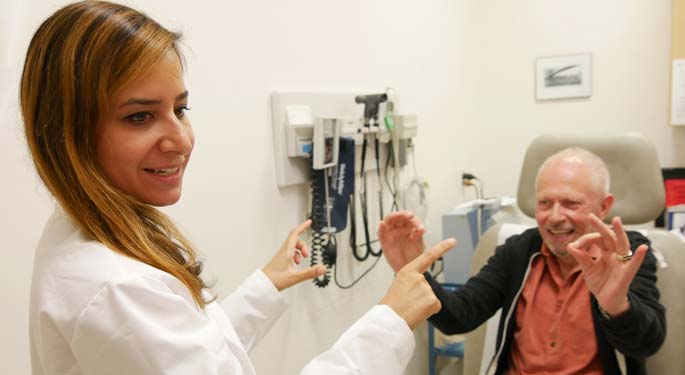Parkinson's Disease

Parkinson’s disease is a common neurodegenerative disorder affecting more than a million people in the United States. The principal features of Parkinson’s disease include slowness of movement, rigidity in the arms and legs, tremor when at rest, difficulty walking, and imbalance. It is important to distinguish Parkinson’s disease from other Parkinsonian syndromes because it helps predict how well you will respond to therapy and how the disease will progress.
Parkinson’s disease is, in general, a slowly progressive disease, though it develops differently for each person. In addition to the typical motor features of Parkinson’s disease, you may experience non-motor symptoms—such as sleep disorders, depression, anxiety, and urinary difficulties—which can be as disabling as the motor features.
Currently, we do not know what causes Parkinson’s disease. Scientists studying genetic and environmental factors have discovered several genetic mutations that may contribute to developing the condition.
Diagnosis of Parkinson’s Disease
The movement disorder specialists at Mount Sinai are expert in diagnosing and treating Parkinson’s disease. There is no one test that diagnoses Parkinson’s disease. Instead, we conduct a comprehensive history of symptoms and a detailed neurologic examination. After we confirm the diagnosis, we develop a comprehensive treatment plan, personalized to your needs.
Our neurosychologists and neuropsychiatrists evaluate patients who are being considered for certain medications or treatments (such as deep brain stimulation surgery), provide support and counseling, and oversee treatments and strategies for dealing with mood, memory, or other challenges.
Treatments for Parkinson’s Disease
Mount Sinai specialists are skilled in providing the full range of therapies for Parkinson’s disease. While your treatment plan may include medications, and possibly surgery, we also believe in the importance of maintaining a regular exercise regimen and eating a healthy, balanced diet.
Medications: The most common treatment for Parkinson’s disease is dopamine replacement therapy, usually levodopa, which generally produces significant improvements in walking and movement, as well as reductions in stiffness and tremors. We also use other medications that target either the synthesis or breakdown of dopamine in the body.
Deep Brain Stimulation: Mount Sinai’s Center for Neuromodulation is recognized for its excellence in performing deep brain stimulation surgery for selected patients with Parkinson’s disease. In deep brain stimulation, electrodes are placed in the areas of the brain responsible for symptoms. We connect these electrodes through a wire to a neurostimulator, also called a battery pack, which delivers electrical stimulation to the brain and can modulate the symptoms of PD. We can adjust the electrical parameters of the device to obtain very good control over symptoms. Most patients experience dramatic improvement.
You are invited to participate in clinical research studies exploring the effectiveness of new treatments in collaboration with the Nash Center for Advanced Circuit Therapeutics and other studies, which offer access to the latest experimental evaluations and therapies as well as ongoing clinical care.
Parkinson’s Foundation Center of Excellence
Mount Sinai Beth Israel is designated as a Center of Excellence by the Parkinson’s Foundation, specialized team of neurologists, movement disorder specialists, physical and occupational therapists, mental health professionals and others who are up-to-date on the latest Parkinson's disease medications, therapies, and research to provide the best care.